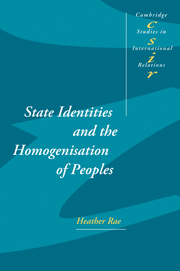Book contents
- Frontmatter
- Contents
- Preface
- Introduction
- 1 State formation and pathological homogenisation
- 2 The ‘other’ within Christian Europe: state-building in early modern Spain
- 3 State-building in early modern France: Louis XIV and the Huguenots
- 4 Pathological homogenisation and Turkish state-building: the Armenian genocide of 1915–1916
- 5 ‘Ethnic cleansing’ and the breakup of Yugoslavia
- 6 Evolving international norms
- 7 On the threshold: the Czech Republic and Macedonia
- Conclusion
- Bibliography
- Index
- CAMBRIDGE STUDIES IN INTERNATIONAL RELATIONS
Conclusion
Published online by Cambridge University Press: 22 September 2009
- Frontmatter
- Contents
- Preface
- Introduction
- 1 State formation and pathological homogenisation
- 2 The ‘other’ within Christian Europe: state-building in early modern Spain
- 3 State-building in early modern France: Louis XIV and the Huguenots
- 4 Pathological homogenisation and Turkish state-building: the Armenian genocide of 1915–1916
- 5 ‘Ethnic cleansing’ and the breakup of Yugoslavia
- 6 Evolving international norms
- 7 On the threshold: the Czech Republic and Macedonia
- Conclusion
- Bibliography
- Index
- CAMBRIDGE STUDIES IN INTERNATIONAL RELATIONS
Summary
This study has addressed several key questions regarding the recurrence of practices of pathological homogenisation in the international system of states: why have such practices been an enduring feature of international history? What role have such practices played in state formation? Why have state elites pursued policies that are, in the end, so often detrimental to their states and societies? Why has the international community failed to eradicate such practices, despite the development, particularly in the post-World War II era, of clear international norms proscribing them?
Until recently such practices gained little attention within international relations scholarship, but with the onset of episodes of ‘ethnic cleansing’ and genocide in Europe and Africa at the end of the twentieth century, they have attracted renewed interest. Understandably, the focus of most recent scholarship is on nationalism, particularly ethnonationalism. But practices of pathological homogenisation were employed by state-builders well before the age of nationalism. As I argued in chapter 1, national criteria of identity, which reflect the principle of political legitimacy that currently structures the international system, are profoundly powerful. However, there are other criteria according to which unified corporate identities have been constructed. Thus, it is state-building and the attendant process of corporate identity formation, and the relationship between these and the social identity of the state, which lie at the heart of this study.
Mainstream theories of international relations are ill-equipped to explain pathological homogenisation, as they explicitly bracket off state formation and the constitution of identities and interests.
- Type
- Chapter
- Information
- State Identities and the Homogenisation of Peoples , pp. 298 - 310Publisher: Cambridge University PressPrint publication year: 2002



